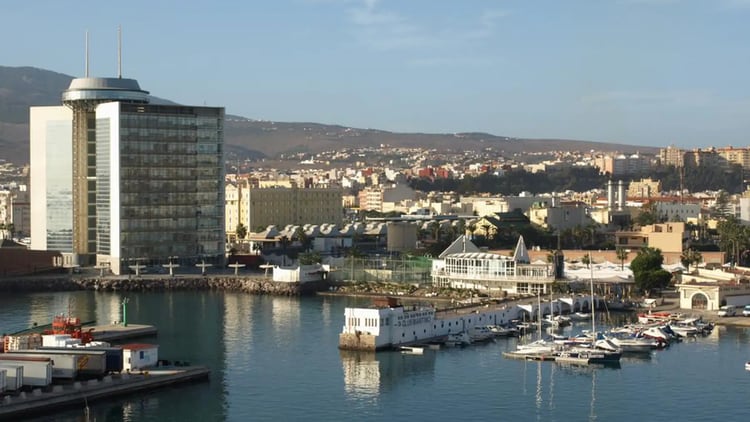The Diplomat
The Foreign Affairs Committee of the Congress of Deputies yesterday rejected a proposal by Vox to ask the Executive to demand that Morocco recognise the Spanish status of Ceuta and Melilla and the rest of the territories in North Africa through diplomatic channels.
Only the PP voted in favour of the proposal, despite the fact that its spokesperson in the debate had considered it unnecessary, something with which the PSOE had also agreed. In the end, the bill was rejected by 20 votes against and 14 in favour, reports Europa Press.
Santiago Abascal’s party wanted Congress to ask Pedro Sánchez’s government to promote “diplomatically” Morocco’s “explicit and unreserved” recognition of Spanish sovereignty over the two autonomous cities, as well as the Chafarinas islands, the rocky outcrops of Alhucemas and Vélez de la Gomera and the islet of Perejil.
In its explanatory statement, reiterated by its spokesman, Alberto Asarta, during the debate, Vox argued that Moroccan “aspirations” over these Spanish territories have no “legal” basis, since they form part of Spain “to all intents and purposes” and before the formal constitution of Morocco as a state in 1956.
In this sense, Asarta criticised the Spanish government’s “futile hope” that Morocco will abandon its assertive policy and its declarations in which it maintains that Ceuta and Melilla are “usurped cities“, as well as the “wavering” of the Executive in its relations with the Alaouite kingdom.
According to the Vox spokesman, if Rabat behaves as it does, it is thanks to the “absence of a firm foreign policy on the part of successive governments” of both the PP and PSOE towards the neighbouring country, arguing that what the Executive should do is “unequivocally defend” all these territories and also protect the Spaniards who reside in them or are deployed there.
The PP had tabled an amendment, which Vox did not want to accept, calling for the text to be replaced by one that called for “adopting as many measures as necessary to guarantee the existence of a model of social, economic and political sustainability” in all these territories.
In his speech, the PP spokesman, Fernando Adolfo Gutiérrez Díaz de Otazu, stressed that “Spain does not need any official recognition of the incontrovertible fact” that Ceuta and Melilla are Spanish and “there is no doubt about it”. Having said this, he added, “Morocco can publicly express whatever it likes”, but its statements “are irrelevant from the point of view of international politics” and are aimed above all “for internal consumption”.
For his part, the PSOE spokesman, Arnau Ramírez, agreed with the PP spokesman, maintaining that Vox’s non-legislative proposal was “gratuitous and unnecessary”. “The signed agreements already recognise the territorial integrity of Spain”, he stressed. The Socialist MP argued that there is no one in Spain who believes that “there is the slightest possibility that the territorial integrity of Spain is in danger, especially Ceuta and Melilla”, not now, not in a year’s time and not in five years’ time.
In Ramírez’s opinion, Vox’s proposal “forms part of the initiatives of the ultra-right to mark a type of politics” so that citizens know them “as a party that defends the unity of Spain with the misnamed manhood” because “the left” does not do so. “The territorial integrity of our country is not at risk, it makes no sense for us to ask Morocco to recognise it,” he said. “We don’t have to ask anyone for permission, not even Morocco, to continue being Spain”, he concluded, criticising Vox for only seeking to “sell a tin-pot patriotism”.
In a heated debate, in which there were several clashes between groups, particularly between Vox and Podemos, and which caused several interruptions, other non-legislative proposals were also approved.
Among those that were passed was one presented by the PSOE calling on the government to support within the EU the inclusion of the Wagner Group and other entities financed by Russia on its list of terrorist organisations for the human rights violations that their mercenaries have committed during the invasion of Ukraine.
In addition, the government is also urged to continue to “reiterate its unwavering support for the territorial integrity of Ukraine within its internationally recognised borders” and to maintain “full support for Ukraine in all legitimate self-defence actions to protect its population and territory”, while continuing to “encourage the process of Ukraine’s integration into the EU in accordance with the procedures and the majority aspirations of the Ukrainian people”.
During the debate on this non-legislative motion, the PP spokesman, Pablo Hispán, criticised the fact that the Minister of Foreign Affairs, José Manuel Albares, has not appeared before the committee to report on what the government is doing regarding the “greatest crisis in Europe” and blamed it on the “internal battle” within the executive on this issue.







